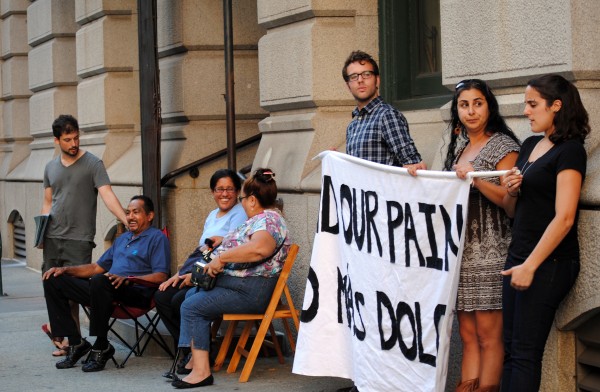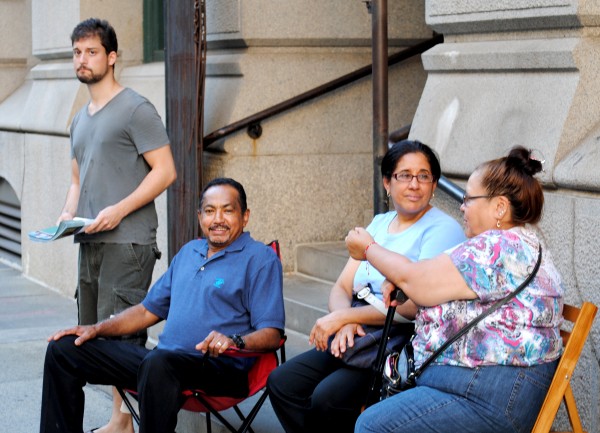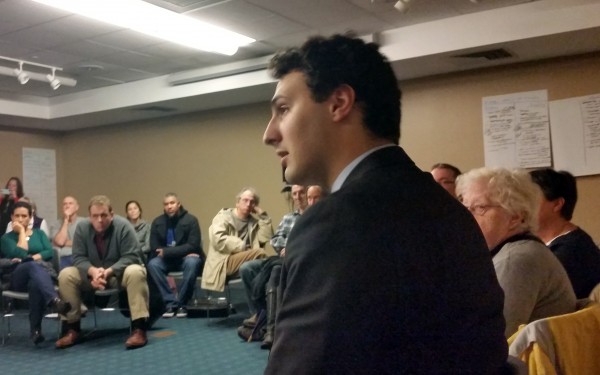 Despite growing consensus that out-of-school suspensions should only be used as a discipline of last resort, Rhode Island school districts continued to overuse suspensions during the 2014-2015 school year, a report by the American Civil Liberties Union of Rhode Island has found. The report, Oversuspended and Underserved, a follow-up to previous ACLU reports on the use of suspensions in Rhode Island public schools, found that schools doled out 12,682 suspensions in the last school year, often for minor misconduct. As in previous years, students with disabilities and students of color served a disproportionate amount of these suspensions.
Despite growing consensus that out-of-school suspensions should only be used as a discipline of last resort, Rhode Island school districts continued to overuse suspensions during the 2014-2015 school year, a report by the American Civil Liberties Union of Rhode Island has found. The report, Oversuspended and Underserved, a follow-up to previous ACLU reports on the use of suspensions in Rhode Island public schools, found that schools doled out 12,682 suspensions in the last school year, often for minor misconduct. As in previous years, students with disabilities and students of color served a disproportionate amount of these suspensions.
While some school districts, education officials, and policymakers have acknowledged the need to address Rhode Island’s suspension problem, today’s report finds that much still needs to be done to address the persistent over-suspensions of even the youngest students. Among the report’s findings for the 2014-2015 school year:
- The suspensions meted out last year resulted in more than 25,000 lost school days.
- Over 1,000 elementary school students were suspended from school. Seventy-five of them were in kindergarten alone.
- More than 60% of all suspensions were meted out for low-risk behavioral offenses such as “Disorderly Conduct” or “Insubordination/Disrespect.”
- Black elementary school children were nearly six times more likely than their white classmates to be suspended from school. Hispanic children were three and a half times more likely than their white elementary school counterparts to be suspended.
- Students with disabilities who have Individualized Education Plans were over two-and-a-half times more likely than a student without disabilities to be suspended from school.
- More than two-thirds of the suspensions levied against high school students with IEPs were for low-risk offenses – exactly the punishment that IEPs should help these students avoid.
The report comes on the heels of the Rhode Island General Assembly’s near-approval this year of legislation to limit the use of suspensions to only those situations in which a child poses a serious physical risk, or when the student is disruptive and other methods to address his or her conduct have failed. The ACLU recommended that the General Assembly enact this legislation as soon as it convenes for its 2016 session.
Among its other recommendations, the report called on the Rhode Island Department of Education to work with districts to determine appropriate solutions for high suspension rates, and for school districts to work with the community to investigate alternative disciplinary methods. The ACLU also reminded parents of their right to appeal suspensions that they feel have been unfairly imposed.
Hillary Davis, ACLU of RI policy associate and the report’s author, said today: “Rhode Island’s children with disabilities and children of color have for too long borne the brunt of a system over-reliant on removing children from the classroom rather than correcting their behavior. The last school year was no exception. Our children deserve the opportunity to learn from their mistakes rather than potentially face a lifetime of severe consequences. Earlier this year, the General Assembly stood poised to make Rhode Island a leader in protecting children from the over-reliance on suspensions. We hope that swift action when the General Assembly reconvenes in January ensures that Rhode Island’s children will no longer find themselves cast out of school because of a bad day.”
A copy of the report is available here.
Previous ACLU of RI reports on school suspensions are available here.
[From an American Civil Liberties Union of Rhode Island press release]
]]>
Hotel workers at the Providence Hilton and Renaissance hotels in downtown Providence are still working without a contract, and are still experiencing work-related injury and illness at rates 69% higher at the Hilton and 85% higher at the Renaissance Hotel than the national average.
Last night workers rallied at the Providence City Hall entrance used by Providence City Council members to let them know that The Procaccianti Group (TPG), the company that runs both hotels, is literally grinding profits out of the long term health of their employees.
People work so that they can maintain their health and lives, not so that those lives can be used up by greedy corporations that value profit over people. What TPG is doing is deeply immoral, which is why the boycott of all TPG hotels is so important. The utter disregard displayed by the Rhode Island General Assembly towards the plight of these workers and their rights has been sickening, and a stain upon our state.
Mike Araujo, on his way to receive his Progressive Hero award from the RI Progressive Democrats of America for his work with the Restaurant Opportunities Center and the One Fair Wage Coalition, stopped by the hotel workers’ protest to lend his support.






Well over 60 people showed up for newly elected State Representative Aaron Regunberg’s District 4 Community Forum at the Rochambeau Library Tuesday night. Regunberg and the helpers he had assembled for the event were pleasantly surprised by the turnout. The event had the feeling of a fresh start for District 4, which has long been represented by former House Speaker Gordon Fox until political scandal destroyed his career. Fox was not what most voters would consider to be accessible, so Regunberg’s collaborative and open style was warmly welcomed.
“I believe in ‘little d’ democracy,” said Regunberg to the assembled voters, before asking those present to suggest topics of political concern. “Education” was suggested first, then “public banking,” “violence,” “the environment” and a dozen more. The list of concerns was then consolidated and posted on large pages that were attached to the walls.
For the next 45 minutes those in attendance broke into smaller groups around the larger topics of concern to discuss possible solutions. Regunberg’s helpers moderated the discussions, and by the end a host of problems were identified and potential solutions were advanced. Regunberg intends to use the ideas generated at forums like this to guide his decisions at the State House.
This was democracy at its most participatory. Regunberg hopes to continue the dialog with his constituents and bring this format to other venues within his district, so he can get a more complete idea of the concerns of voters in all the neighborhoods he represents.
Time will tell if Aaron Regunberg can bring the kind of change he’s already brought to District 4 to the State House, where the culture can be poisonous and intransigent. But Regunberg’s experiment in “little d” democracy could prove to be a game changer in Rhode Island if more state representatives and senators were to implement it.
]]> Olon Reeder, a slight-figured, unassuming, behind-the-scenes kinda guy, has been quietly improving the quality of life in northern Rhode Island for decades as a public affair adviser for the Blackstone Valley Tourism Council.
Olon Reeder, a slight-figured, unassuming, behind-the-scenes kinda guy, has been quietly improving the quality of life in northern Rhode Island for decades as a public affair adviser for the Blackstone Valley Tourism Council.
With his years of working in the public sector, as legislative assistant with the Rhode Island General Assembly in the mid-to-late 1970s, with the Garrahy administration, state agencies and with small businesses, he’s authored a nontraditional economic development policy paper he hopes will be considered in next year’s Rhode Island General Assembly debate as to how to create a more vibrant business environment in the Ocean State.
Over the years, Reeder, President of Reeder Associates, a Southern New England-based public relations and multi-media communications company, has seen state lawmakers and its economic development agency attempt to compete with surrounding states, just going after “larger, trendy, projects to turn the economy around. “Smaller companies would always get the short end of the stick, because they were not seen as a viable economic generator,” he says, stressing that this perception is inaccurate.
In recent years economic development solutions to fix the state’s ailing economy have been floated for public debate by lawmakers, economic development professionals or by large corporations. Today, Reeder, with almost 40 years of in the public and private sectors, calls on state lawmakers to consider his proposal when they focus on economic reform in next year’s session. More needs to be done, says the small businessperson who is a Native Rhode islander.
It’s almost like Mr. Reeder goes to Smith Hill, to take on the establishment to be heard.
“We are at a critical crossroads where we must overcome our negatives attitudes and start taking actions ourselves if we all want our state and our lives to become successful,” Reeder wrote in a recently-released policy statement detailing his suggested economic development action agenda, as how to improve the state’s long term quality of life, through investing in people, communities and small businesses.
He calls for tying lifelong education to grow the economy. “Brain power is a key element driving worldwide demands and economic activity today, through the convergence of non stop knowledge, creative economy, enterprise and innovation, art-design connections, which all start with lifelong learning,” he says.
He says personal empowerment creates the environment for change “Empowerment encourages, and develops the skills for, self-sufficiency, giving people the abilities and knowledge that will allow them to overcome obstacles in life or work environment and ultimately, help them develop within themselves or in the society,” he says.
Companies are constantly replacing full-time employees, he said, and now relying upon independent contractors, where people who once counted on a steady pay check are now being left to fend for themselves in a hyper-competitive self employed market. These individuals are oftentimes forgotten by policy makers.
Based on 2011 figures from the US Bureau of Labor Statistics, in Rhode Island, there re over 73 thousand self employed contributing over $3 billion annually to the state’s economy. Most self employed are hired out of necessity, are done so locally and through word of mouth. Because freelancers depend so much on self promotion to get their jobs, they must focus on the local markets, along with showcasing their diverse personal talents, marketing their skills to business owners in their community, along trying to compete with others for opportunities.
Reeder recognizes the importance of valuing our places, spaces and communities, to grow business. “More than ever, people must be connected to where we live, work, play, stay and travel. People expect places and spaces they interact with daily to be vibrant, active, socially appealing, culturally stimulating and help them in improving their quality of life, especially with their physical and mental health,” he says.
Reeder notes active living communities provide opportunities for people of all ages and abilities to engage in routine daily physical activity, he says, like pedestrian and bicycle friendly design, access to intermodal transportation, mixed use development, ample recreation, walkable neighborhoods, access to fresh and healthy foods and commerce centers. This philosophy must be included in any state economic development plan.
“Our economic revitalization is relevant to healthy and sustainable communities because active living communities encourage individuals to be more physically active, improving health by lowering citizens’ risk for health conditions, adds Reeder. “Active living communities create enhance quality of life, attract business and knowledge workers, and contribute to ongoing economic development,” he says.
Reeder stresses that technology is a must, as people are now “required” to have 24/7 365 access to the Internet and must now communicate through social media to live, work, and transact personal activity, he calls for providing everyone with free online access “as a necessity of our 21st century lifestyles.”
Finally, Reeder thinks “Demand Driven Experiences” are necessary for not only reinventing our state’s manufacturing, but in changing our self attitudes about how Rhode Islanders see themselves, ultimately affecting expectations others may have about the perception of Rhode Island as the worst place for business.
“Because people no longer buy things for their personal benefit, they want enhancements to fulfill missing elements of their lives,” adds Reeder, noting that experiences are crucial for businesses and locations as a branding and marketing tool, especially with efforts in Rhode Island attracting people to live and travel here for our entertainment, food and lifestyles.”
“Using our experiences to effectively promote market and give an iconic brand, we must also stay true to the “real Rhode Island,” to our proud independent and working class heritage, the ethnic and cultural diversity in our state, and preserving our unique natural resources,” he says.
State lawmakers are moving in the right direction to make Rhode Island a more business-friendly place to operate. Reeder continues his efforts to get his voice heard by General Assembly leadership, state policy makers, business groups, even gubernatorial candidates. Hopefully, they will choose to closely listen to Reeder’s nontraditional approach to economic development and to small business owners who know their specific needs to operate successfully.
]]>So the district results aren’t the best way to figure out how voters would’ve selected candidates in an MMP election. The best way would be to actually run an MMP election. But that’s a constitutional amendment and referendum away.
Another limitation is thinking about this as a series of MMP elections rather than what would be different if each election was the first MMP election ever. It’s not so much a problem with the results, it’s an issue with how the results might have been effected.
For instance, the list candidates would be campaigning all over the state, raising their profiles tremendously. They also are more beholden to the party, making internal party politics incredibly important to voters. In an MMP election, non-district candidates are ranked by their party on a list, in the order that the party wants to be seated. So a party’s number one selection is a person they’ve marked as someone they really want to be in the chamber. This means these top candidates are reflective of the party’s general principles.
Figuring out how this would change things is very difficult. I have no idea how crucial the 2002 election might’ve been, when over half of the General Assembly could have been new members with little understanding or care for the various stupid customs the General Assembly operates on. Would these new Reps and Senators have transformed the GA? Or would they have been totally consumed by its workings? And would the split between list candidates and district candidates have caused fissures in the parties during general election campaigns?
A final thing is the number of times the Democrats lose their veto-proof supermajority in the MMP system. It happens in 2004 and 2010, when they underperform with voters. They regain it in two years, but those four years when they lose it could be crucial. The General Assembly may have been far more conservative in the years immediately after 2004 if Gov. Carcieri could’ve vetoed legislation and made it stick. Gov. Chafee might be more popular if he’d been more assertive as a result of his veto power. We talk about the weakness of the governor in Rhode Island, but in this case the Governor has been weakened by circumstance rather than by design.
Beyond this, we really don’t have much of a party system in Rhode Island beyond the Big Two. Most parties can’t pass the threshold for state recognition, which means they don’t get the advantage of appearing at the top of the ballot or on voter registration forms. Smaller parties also suffer far worse from the recruitment problems that all the parties have to some extent.
This is Part 10 of the MMP RI series, which posits what Rhode Island’s political landscape would look like if we had switched to a mixed-member proportional representation (MMP) system in 2002. Part 9 (the Election of 2012) is available here. Part 11 is another look at the Election of 2010.
]]> So, yesterday was the day when Senate President Teresa Paiva Weed threw down 25 bills that she hopes will “improve Rhode Island’s business climate and its position on national business-friendliness surveys.” After years of bad decisions and then paralysis, the General Assembly now has a collection of bills to review that stem from the recommendations set forth in Moving the Needle, a joint report by the Senate Policy Office and the business backed policy group RIPEC.
So, yesterday was the day when Senate President Teresa Paiva Weed threw down 25 bills that she hopes will “improve Rhode Island’s business climate and its position on national business-friendliness surveys.” After years of bad decisions and then paralysis, the General Assembly now has a collection of bills to review that stem from the recommendations set forth in Moving the Needle, a joint report by the Senate Policy Office and the business backed policy group RIPEC.
Before I look into the actual legislation, I wanted to make a general comment about the obsession that people have regarding national business rankings. Rhode Island all too often gets hung up on its self-defeating cynicism and inferiority complex. Rather than looking at the assets that exist in the state and developing a plan to use those assets to grow the economy and support the businesses that currently exist, policymakers seem obsessed with how we rank nationally. People generally forget that before the global economy went down the toilet, Rhode Island had an unemployment rate that matched the national average. A lot has happened in the past 6 year, but in March 2007 the state’s unemployment rate was 4.8%. Aside from the global recession, I’m not sure the structure of every state’s economy has changed all the dramatically.
One word of advice would be to just stop looking at national ranking. Rhode Island is not Texas. Rhode Island will never be Texas. The only way Texas will ever be relevant to Rhode Island is if there is something very specific that Texas does that Rhode Island may want to replicate.
I humbly offer my comments about specific pieces of legislation while acknowledging that overall much of it makes sense, but will likely only be marginally beneficial.
- Division of Economic Data and Information: This, to me, seems like it should exist within the Economic Development Corp. But aside from where the function sits, gathering detailed economic data, analyzing that data, and using it to inform strategy is critical to growing the economy. Equally important, though, is that this needs to be something much more than a person who merely aggregates information from the Division of Labor and Training.
- Long-Term Strategic Visioning Document: Planning is good and every successful business and government does it. Rhode Island should do it too. Something that has always frustrated me about Rhode Island is its lack of implementation. If one were to do a scan of the past few years, they could find a whole assortment of studies, economic development plans, guidance documents, etc. But what the state has not yet done, what it seems the state is incapable of doing, is developing an implementation plan, a governance structure to facilitate the execution of the implementation plan, and granting it the authority and autonomy to do it. Again, I think much of this should be housed in the RIEDC.
- Commerce & Workforce Coordination Cabinet: I’m all for cross-departmental coordination, but I fear this may just be another meeting that people have to attend. I think it comes down to how much autonomy it will have to offer recommendations for the long-term strategic vision, how willing this or any Governor is at listening to and incorporating that advice, and how serious public officials will be with the task at hand.
- Business Presence on Statewide Planning: Planning for the state’s transportation, water system, affordable housing, growth centers, economic development, etc. is a skillset that business may not have. I’m fairly indifferent about including some business presence on the State Planning Council to incorporate some additional information that they may not be getting, so long as they let the professionals do their jobs.
- Preserving the Renewable Energy Fund: Yes please. Additionally, I would boost the fund to at least $10 million and provide low interest loans and limited grants to those who would like to invest in renewable energy for residential properties.
- Back to Work Rhode Island: I have very mixed feelings about this. On the one hand, unemployed Rhode Islanders can quickly become irrelevant in a rapidly changing labor market. Ted Nesi recently highlighted this when he asked if Rhode Island is suffering from hysteresis. The longer an unemployed worker is out of a job, the less appealing they become to potential employers. If for nothing else, getting some skill training and having a recent job listed on a resume makes me want to support this. On the other hand, I wonder what the oversight mechanism will be. I can picture unscrupulous employers abusing this system and churning though workers on an ever-repeating 6 week basis (think restaurants, retail, hospitality, etc.) without staff time dedicated to oversight.
- Childcare for Participants in Workforce Training and Childcare Assistance Pilot: YES. This is critically important for single parents who want get job training but cannot afford child care. I would also add transportation vouchers for them to get to and from training.
- Enhanced Jobs Match:The state should be thinking more creatively about linking the unemployed to employment opportunities, especially considering the dwindling funds for job training. The state needs a system that better links the supply of skills that the unemployed has with the demand for skills that employers need. If there is a huge unmet need for a prolonged period of time, then training funds should be used to meet that need. The problem is, and it is no small problem, it will take more time to screen candidates at the local One Stops, which means if the state doesn’t put more resources to this important task, fewer people get served. If DLT needs help with this system, they merely have to tap the vast network of tech folks in Providence who could probably design and build a better system than what we have over the weekend… while they sleep.But more to the point, Rhode Island needs more than just this. To put it bluntly, the public workforce system is broken. In particular, it is underfunded and operates in silos. And in Rhode Island, the folks at Workforce Solutions of Providence / Cranston don’t have the same level of authority as the folks who work at Workforce Partnership of Greater RI. The former are city employees, the latter are DLT employees with much greater access. Also, there are not enough people in the public system who can speak Spanish. I wrote a report for the City of Providence last year called Rethinking Workforce Development for Providence’s Labor Force that details a lot of the issues that make the system inefficient and ineffective. The system needs more than a new website.
- Help Former Students Finish Their Degree: It’s a good idea to help people get their degrees, but there are a lot of reasons why people leave college prior to completion: transportation, shift change, child care, used up Pell grant, etc. Communicating with students to get them to finish is a good thing, but someone needs to actually do it.
- Reverse Transfer: This would allow for credits earned for a Bachelor’s degree to be transferable toward an Associate’s degree at CCRI. Might as well, but it will likely be underutilized.
- Economic Development Tax Credit Accountability Act and Tax Credit Statement of Purpose: Yes, but EVERY SINGLE tax credit and expenditure offered by the state should be reviewed for their cost and effectiveness at generating economic growth. Any tax credit or expenditure that is shown to not generate an appropriate level of growth to justify its cost should be eliminated.
- Restore Historic Tax Credits: Rhode Island, I want you to understand that if you do this, it will cost a LOT of money.
Much of what came out yesterday is non-controversial and fairly common sense. To quote a colleague: “Congratulations to the Rhode Island Senate for formulating a plan to get us out of the recession, 4 years after it officially ended. I knew you could do it.” The unfortunate reality is that it will take a while for the state to grow out of the recession. This is just the first step.
]]> So in the 2011-2012 General Assembly class, roughly 1 in 4 legislators were lawyers. Now, that’s a considerable over-representation. Thus it’s not surprising to me that the legislature typically starts its session about the time court gets out.
So in the 2011-2012 General Assembly class, roughly 1 in 4 legislators were lawyers. Now, that’s a considerable over-representation. Thus it’s not surprising to me that the legislature typically starts its session about the time court gets out.
Lawyers are also adept at writing laws, typically in legalese (despite there being more efficient and understandable ways to write legally binding documents in plain English). Any legislator or citizen that wishes to pass a bill must likewise be able to write in language understandable to lawyers, but much more difficult to parse for the average person.
This over-representation of the legal profession (and other professions) has led some to point out that our legislature is vastly different from the people it represents. This is a national phenomenon, as RIPR’s Ian Donnis pointed out in October. Mr. Donnis limited his discussion to Rhode Island’s federal officers, but our farm team, state government, is also vastly different from the people it represents. So the question is, how do you create a legislature more representative of the people of Rhode Island?
Moderate Party Chair Ken Block has a “solution”: shorten the legislature’s amount of time in office to three months a year. That idea might appeal to the small-government types Mr. Block sort-of represents, but it’s ultimately irrelevant to the question above. Whether it’s one day or twelve months without holidays or weekends, how often the legislature meets is not going to.
We have to make Rhode Island’s legislature more representative of its people.
Yet, there remains little incentive to serve. Beyond the amount of abuse you’re going to take (we can argue whether that abuse is warranted or not), the legislature is a demanding job for little pay. Your constituents need your assistance at all hours, regardless of whether you have cows to milk or legal documents to file. You are reasonably likely to spend the period from June to November running for office; though a number are fortunate enough that Rhode Islander apathy and Democratic inertia combine to allow them to run unopposed or avoid either a primary or general election.
A problem small-government types like Mr. Block run up against is that we consider that legislative work is “public service.” So is fire-fighting, police work, or any of the other various services that governments provide. Yet all of those workers are compensated. There has been so much antagonism towards compensation for RI legislators that 30 lawmakers refused their mandated raise. While far too many of us struggle to make ends meet, these lawmakers are literally turning down money.
Recognizing that there is a disconnect between the constituent and their representative, that the latter is in a privileged position, hurts no one. But attempting to pass off that the solution to this issue is halving the number of months the legislature serves is disingenuous at best and intentionally misleading at worst.
Few working people have both the time to take off or the money to spend to mount an effective campaign against incumbents. Among those that can, even fewer are likely to find employers who are willing to let them leave work early, or take a break to field constituent calls. Is it any wonder why such a system favors the wealthy, the different, the unrepresentative would-be representative?
We need to reform our campaign finance laws, and we need a wage for our lawmakers that would allow them to take care of themselves and their families while being able to give their full undivided attention to the needs of their constituents and their state. Until then, we will have to rely on those extraordinary individuals that heed these words from Rep. Teresa Tanzi’s keynote speech to Netroots Nation 2012:
You need to join me. Take the next step, run for office. Yes, you. The one with the family, the job, the crushing load of schoolwork, the fuller than full plate. YOU! Anything less than full participation will not be enough.Now, can you hear I’m talking to you? I need you standing beside me when the doors close to the public, and the negotiations begin. I need you sitting beside me, after the debate ends, the votes are taken and a proposal becomes law. I need your voice to be the voice of all the women, families and children who are voiceless and invisible. I need you to join me. You. I am talking to you.
